Best Jazz Bass
String
-
Overall: 9/10
-
Best Feature: Low tension for easy playability
-
TedScore™: 9/10
Best Versatile
Jazz Strings
-
Overall: 9/10
-
Best Feature: Durable and long-lasting
-
TedScore™: 9/10
Best Jazz Strings
for Playability
-
Overall: 8.5/10
-
Best Feature: Great for slide-playing
-
TedScore™: 8.5/10
Imagine being a jazz bassist and knowing that finding the perfect strings can completely change your sound.
The best jazz bass strings offer a balance of warmth, clarity, and sustain.
Whether you’re playing traditional jazz, fusion, or anything in between, the right set of strings can help you achieve the perfect tone.
There are many different types of bass strings on the market, but not all are suitable for jazz. Some strings are too bright and harsh, while others lack the depth and warmth bass players seek.
In this post, I’ll explore some of the best bass strings perfect for jazz and learn more about how you can get that perfect groove!
I quite often use the Ernie Ball Regular Slinky Nickel strings – but there are others in my list too that I really, really like.
Flatwound Vs. Roundwound Strings

When choosing the right strings for your jazz bass, you’ll likely come across two types: the roundwound and flatwound bass strings.
Each has its own unique characteristics that can affect the tone and sound of your bass. Here’s a breakdown of the differences between the two:
Flatwound Strings
Flatwound strings have a smooth, flat surface that produces a warm and mellow tone. They’re often used in jazz music, as they provide a vintage sound reminiscent of the 1950s and 1960s.
They’re also great for playing with a pick, producing less finger noise than roundwound strings.
- Warm and mellow tone
- Great for playing with a pick
- Less finger noise than roundwound strings
- Less sustain than roundwound strings
- Less bright tone than roundwound strings
Roundwound Strings
Roundwound strings have a textured surface that produces a bright and punchy tone. They’re often used in rock and pop music, as they provide a modern sound that is great for cutting through a mix. They also have more sustain than flatwound strings.
- Bright and punchy tone
- More sustain than flatwound strings
- Great for cutting through a mix
- More finger noise than flatwound strings
- Can be harsh on the fingers during extended playing sessions
String Gauges
When it comes to selecting the right bass strings deals for your jazz bass, the string gauge is a crucial factor to consider.
String gauge refers to the thickness or diameter of the strings, which can significantly affect the tone and playability of your bass guitar.
Generally, thicker strings produce a fuller and richer tone, while lighter strings offer a brighter and more articulate sound. However, thicker strings can be more challenging to play, especially for beginners or those with smaller hands.
On the other hand, lighter strings may feel more comfortable to play, but they may lack the low-end response and sustain that jazz bassists typically require.
The optimal string gauge for jazz bass playing depends on your playing style, musical preferences, and the type of bass guitar you own. Here are some popular string gauges used by jazz bassists:
This is the standard gauge for most jazz basses and provides a well-balanced tone with a good amount of low-end response and clarity. It’s an excellent choice for players who prefer a versatile and responsive sound.
This gauge is slightly thicker than the standard gauge and offers a more robust and punchy tone with enhanced sustain and projection. It’s ideal for players who want a more aggressive and powerful sound.
This gauge is lighter than the standard gauge and provides a brighter, more articulate sound with less low-end response. It’s suitable for players who prefer a more treble-heavy sound and want to play with more speed and agility.
Materials
Stainless steel bass strings are known for their bright, clear tone and long lifespan.
They’re also highly resistant to corrosion and rust, making them a popular choice for players in humid or coastal environments.
However, stainless steel strings can be quite stiff, making them challenging for some players to play.
Stainless steel bass strings are known for their bright, clear tone and long lifespan.
They’re also highly resistant to corrosion and rust, making them a popular choice for players in humid or coastal environments.
However, stainless steel strings can be quite stiff, making them challenging for some players to play.
Steel core bass strings are made with a steel core and wrapped with various materials, such as nickel or stainless steel.
They offer a bright, punchy tone and are very responsive to the player’s touch. However, they can be quite harsh on the fingers, particularly for players who play with a lot of force.
Nickel-plated steel bass strings are popular for jazz bassists due to their warm, balanced tone and smooth feel. They are also quite versatile, making them a good choice for a wide range of musical styles.
However, they are not as durable as stainless steel strings and may need to be replaced more frequently.
Brand Recommendations
When it comes to choosing the best jazz bass strings, there are a few brands that stand out from the rest. Here are some brand recommendations to help you make an informed decision.
Ernie Ball
For good reason, Ernie Ball is a well-known brand in the music industry. Their Regular Slinky Nickel strings are popular among bass players, including those who play jazz.
The composition of these strings consists of a tin-plated hex-shaped steel core wrapped with nickel-plated steel wire. They provide a bright, balanced tone and are easy to play.
Ernie Ball Regular Slinky Nickel Bass Strings
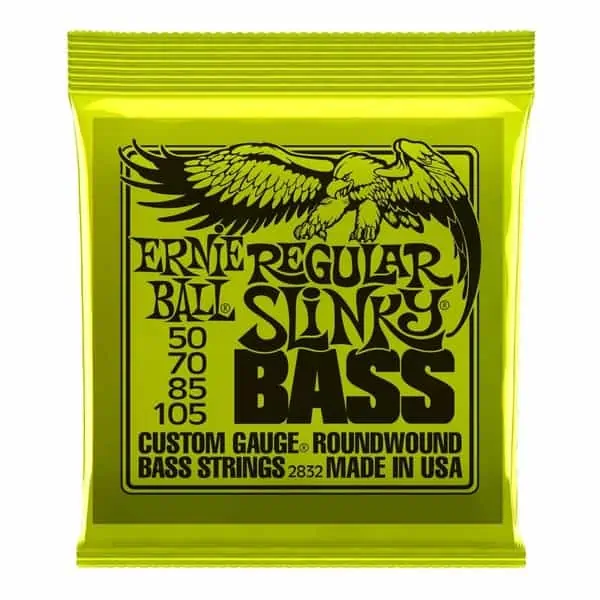
FEATURES:
- Nickel-wound construction
- Available In Multiple Gauges From 40-95 To 55-110
- Versatile tone range, well-suited for various musical genres and playing styles
- Specifically designed for bass guitars
- Excellent tonal balance and tuning stability
- Durable and long-lasting
- Smooth and comfortable to
- No vintage tones
When you click ‘Check Price’, you’ll see there are loads of great places to buy this item. Our personal favorite is Sweetwater for the US, and Thomann and Gear4Music for the UK & Europe.
They are the largest music retailers, with excellent customer service, competitive prices, really fast shipping, and the longest guarantees.
The professional musician who wrote this article combined many things,
from the product build, manufacturer’s reputation through to feedback
from other users, to create our famous TedScore™.
D’Addario
D’Addario is another brand of strings that musicians highly regard. Their NYXL Bass strings are a great option for jazz bass players.
These strings are made from a high-carbon steel alloy, which makes them stronger and more durable than other strings. They also provide a clear, articulate tone and are easy to play.
Daddario NYXL4095, Bass Gtr String Set Long Scale Super Light 40-95
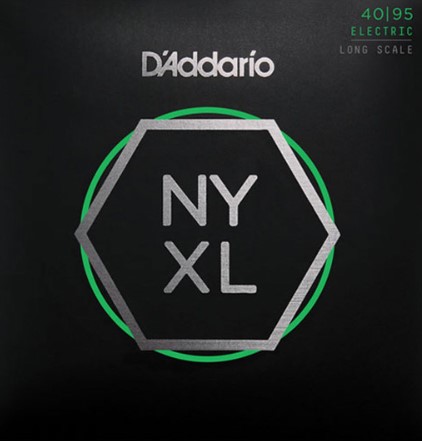
FEATURES:
- Enhanced strength and pitch stability
- Improved tuning stability
- Increased flexibility and response
- Four-String, Five-String, And Six-String Gauges are available
- Longer lifespan compared to traditional bass strings
- Excellent intonation and tone clarity
- Suitable for a wide range of musical genres
- The guitar strings are not ideal for players who like a brighter tone
When you click ‘Check Price’, you’ll see there are loads of great places to buy this item. Our personal favorite is Sweetwater for the US, and Thomann and Gear4Music for the UK & Europe.
They are the largest music retailers, with excellent customer service, competitive prices, really fast shipping, and the longest guarantees.
The professional musician who wrote this article combined many things,
from the product build, manufacturer’s reputation through to feedback
from other users, to create our famous TedScore™.
Rotosound
Rotosound is a British company that has been making strings since the 1950s. Their Jazz Bass 77 strings are a popular choice among jazz bass players.
These strings are made from stainless steel flat wire wrapped around a hexagonal core. They provide a warm, mellow tone and are easy to play.
Rotosound RS77LD Jazz Bass 77 Flatwound Bass Guitar Strings, 45-105

FEATURES:
- Monel flatwound construction
- Smooth feel and exceptional comfort
- Enhanced low-end response
- Vintage tone with a warm, mellow sound
- Great sustain and excellent intonation
- Reduced finger noise for smoother playing
- May lack brightness and high-end definition compared to roundwound strings
- Slightly higher tension than other flatwound strings
When you click ‘Check Price’, you’ll see there are loads of great places to buy this item. Our personal favorite is Sweetwater for the US, and Thomann and Gear4Music for the UK & Europe.
They are the largest music retailers, with excellent customer service, competitive prices, really fast shipping, and the longest guarantees.
The professional musician who wrote this article combined many things,
from the product build, manufacturer’s reputation through to feedback
from other users, to create our famous TedScore™.
Thomastik-Infeld
Thomastik-Infeld is a preferred bass string brand for jazz due to its exceptional quality and tone.
Their strings are known for their excellent response and playability, making them highly suitable for the intricate and nuanced style of jazz bass playing.
The materials used in Thomastik-Infeld strings, such as steel and nickel, contribute to their warm, rich, and well-balanced sound, which is desirable in jazz.
Thomastik-Infeld JF344 Jazz Flatwound Strings
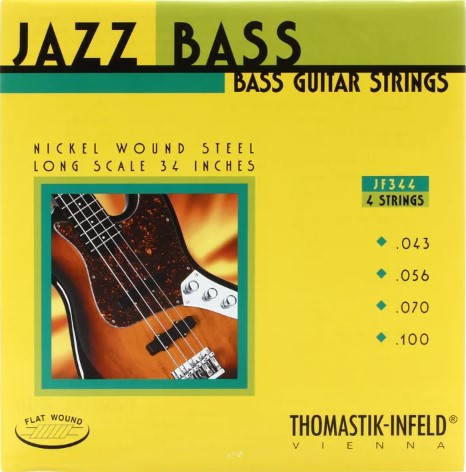
FEATURES:
- Made with a flatwound design, which gives them a smooth, mellow tone
- Has a silk inlay between the windings and the core to reduce unwanted overtones
- Available in a light gauge, providing a comfortable feel
- Exceptional sustain
- Great for slide-playing
- Long-lasting durability
- Less brightness and high-end clarity compared to roundwound strings
- Higher tension may require adjustments to the guitar's setup
When you click ‘Check Price’, you’ll see there are loads of great places to buy this item. Our personal favorite is Sweetwater for the US, and Thomann and Gear4Music for the UK & Europe.
They are the largest music retailers, with excellent customer service, competitive prices, really fast shipping, and the longest guarantees.
The professional musician who wrote this article combined many things,
from the product build, manufacturer’s reputation through to feedback
from other users, to create our famous TedScore™.
La Bella
La Bella is considered a top-tier bass string brand for jazz due to their outstanding reputation and sound quality.
Their strings are known for their deep, warm tone and excellent sustain, which are essential elements for achieving the desired jazz bass sound.
The high-quality materials used by La Bella, such as stainless steel and nickel, contribute to their rich and balanced sound.
La Bella 760FL Deep Talkin' Bass Flats
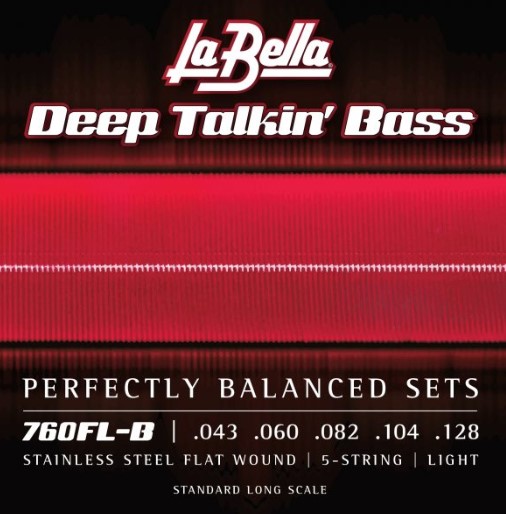
FEATURES:
- Durable stainless steel construction
- Low tension for easy playability
- Deep and rich tone with excellent sustain
- Authentic vintage sound ideal for classic rock, jazz, and blues genres
- Smooth feel and reduced finger noise
- Long-lasting and reliable performance
- Slightly higher price compared to other bass strings
- May require some adjustment to get used to the lower tension
When you click ‘Check Price’, you’ll see there are loads of great places to buy this item. Our personal favorite is Sweetwater for the US, and Thomann and Gear4Music for the UK & Europe.
They are the largest music retailers, with excellent customer service, competitive prices, really fast shipping, and the longest guarantees.
The professional musician who wrote this article combined many things,
from the product build, manufacturer’s reputation through to feedback
from other users, to create our famous TedScore™.
Bass Strings vs Other Guitar Strings
Maintaining your bass strings is essential for longevity and optimal performance. Here are some tips for properly caring for your bass strings and extending their lifespan:
1. Clean your strings regularly
2. Use a string cleaner and lubricant
3. Store your bass properly
4. Change your strings regularly
5. Consider coated strings
Bass Strings vs Other Guitar Strings
When it comes to guitar strings, bass strings stand apart from the rest. The primary distinction lies in their size and thickness.
Bass strings are substantially thicker and longer compared to other guitar strings. This variation directly affects the sound produced by the instrument.
The thicker gauge of bass strings yields a deep, low-end tone that contributes to the distinct sound and presence of bass guitars.
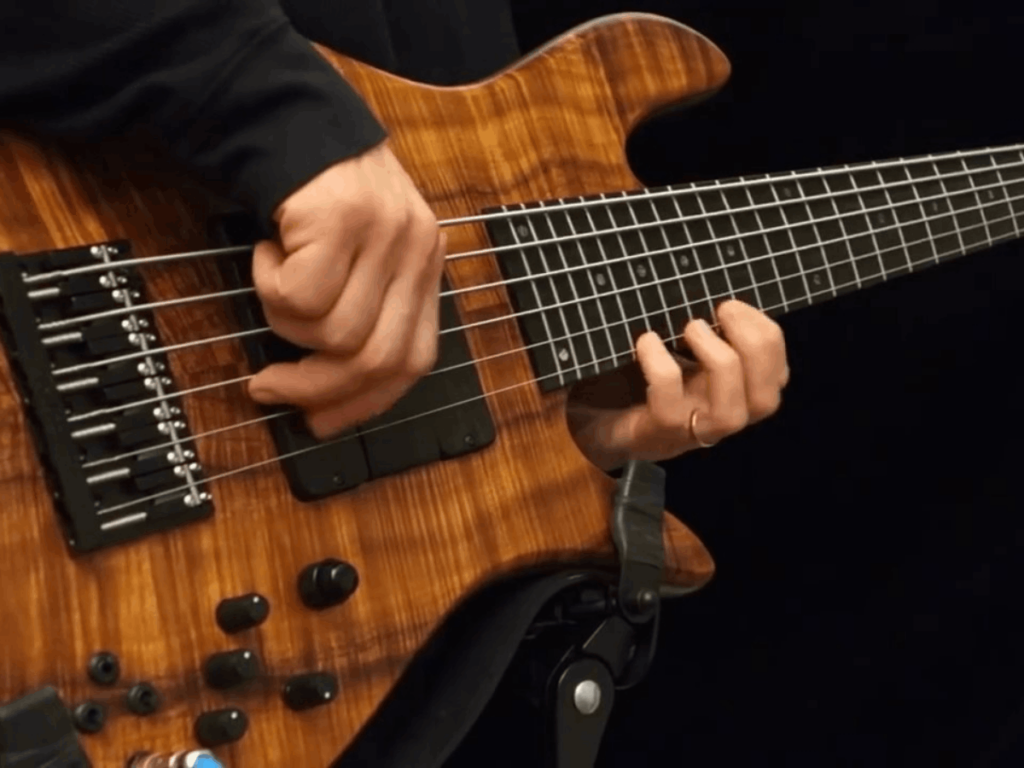
Plus, the increased tension required to tune and play bass strings allows for greater sustain and stability, enhancing the instrument’s overall performance.
Best Jazz Bass Strings
Final Thoughts
Selecting the best jazz bass strings can greatly impact your tone and feel, and ultimately enhance your jazz bass-playing experience.
Whether you prefer the warm and mellow tone of flat-wound strings or the brighter and more articulate tone of round-wound strings, various options suit your playing style and preferences.
So experiment with different strings to find the ones that best suit your jazz bass-playing needs, and take your music to the next level!
Wait, there’s more!!!
When it comes to jazz music, selecting the right guitar amp is just as important as selecting the right bass strings.
The right amp can help you achieve the desired tone and feel for jazz guitar playing, and complement the warm and mellow tone of jazz bass strings.
Jump into the next article and get your answer for this intriguing question: What Is The Best Guitar Amp For Jazz?
FAQ's
Flatwound strings are generally considered the best strings for jazz as they provide a warm and mellow tone with less finger noise. Some popular brands include D’Addario Chromes, Thomastik-Infeld Jazz Flats, and La Bella Deep Talkin’ Bass.
Both 4 and 5-string basses can be used for jazz music, but 4-string basses are more commonly used due to their simplicity and traditional sound. However, 5 string basses can offer extended range and versatility for jazz bassists who want to experiment with lower notes and more complex chord progressions.
While flatwound strings are generally preferred for jazz bass, some jazz bassists prefer the brighter and more articulate tone of roundwound strings. Some popular roundwound options for jazz bass include the D’Addario NYXL and XL strings, the Ernie Ball Slinky series, and the GHS Precision Flats.
There is no one “best” brand for bass strings as each brand offers unique qualities and preferences vary among bassists. Some popular bass-string brands include D’Addario, Ernie Ball, Thomastik-Infeld, La Bella, and DR Strings.
In jazz, bassists commonly use a variety of bass guitars, including the Fender Jazz Bass, the upright bass, and the fretless bass. Other popular bass guitar models in jazz include the Gibson EB-3 and the Rickenbacker 4001.











Love the jazz bass strings part! Can’t wait to try some recommendations.
Regarding the materials section, I’d posit that nickel-plated steel strings offer a balanced tone that’s neither too bright nor too warm, making them versatile for various genres. However, pure nickel strings, as mentioned, do cater to those seeking a vintage sound, but it’s not just about the genre but also the player’s touch and the instrument’s characteristics.
Spot on, TheoristCat. It’s all about finding that sweet spot where technique, gear, and musicality meet. Tried several types through the years, and it’s always a rewarding quest.
always thought that string gauges were confusing, but this makes it clearer. light strings for bending, heavier for that chunky rhythm sound. got to try some thicker ones on my guitar!
Hey Hugh Richardson, quick one – between flatwound and roundwound, which one’s better for a warm, jazzy sound? Been a bit confused here, thanks!